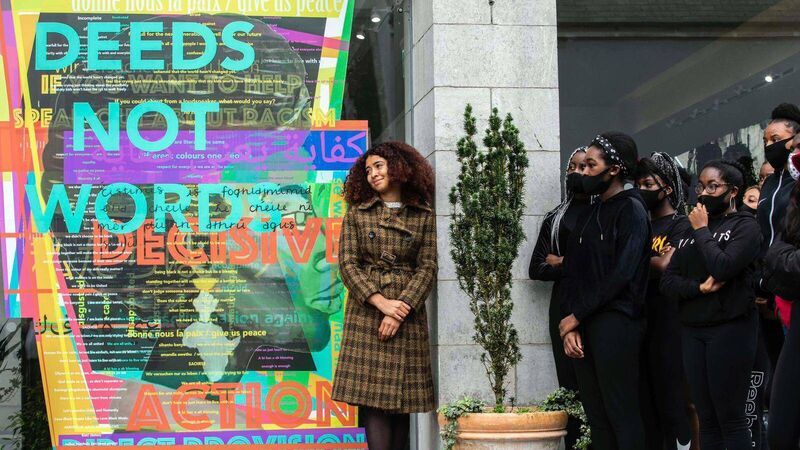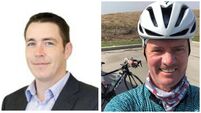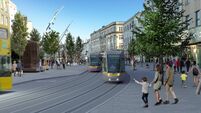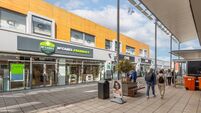Cork event encouraged young people to speak up on racism and hope for a better future

Fionnuala O'Connell of the Cork Migrant Centre, which organised the recent webinar to highlight issues of racism and the need for change. Pictured with young people who took part in the webinar. Pic: Clare Keogh
A RECENT event organised by the Cork Migrant Centre (CMC) empowered young people to speak about their experiences of racism, allowed them to call on those in power to make changes, and encouraged them to hope for “true change”.
Organisers of the event hope it is a stepping stone to greater collaboration and education on the issue of racism in Ireland, and to putting a stop to such racism.
The CMC Youth Initiative against Racism in Collaboration with the Cork Children and Young People’s Services Committee (CYPSC) Webinar was held via Zoom over the summer with more than 500 people registering.
The webinar was organised in the wake of the murder of George Floyd, bringing the realities of racism and discrimination around the world and in Ireland to the forefront.
Fionnuala O’Connell is a volunteer youth leader working with youths in their many activities to empower them, building their confidence and supporting them in their interests.
“Until the webinar, many young people have been silenced, taking the comments, the harassments, and stares as they move through their lives for simply being a different colour,” said Fionnuala.
“They have been consuming it all and it has impacted their mental health.
“The webinar was created to channel and amplify the voices of the youths, including those living in direct provision, freely and without fear, to give a voice to young people’s experiences of racism, for their voices to be heard by policymakers and service providers,” she said.
“But, most importantly, to open dialogue with the listeners, to commit to working towards more inclusive, anti-racist environments/spaces and policies.”
When the need for the webinar was established, Fionnuala worked closely with Naomi Masheti, programme co-ordinator of CMC, to gather a team of youths and allies to help shape and support the webinar.
The groups included UCC Africa Society, UCC University of Sanctuary, UCC Fáilte Refugees society, Hear Speak Do, and Cork City Council’s Social Inclusion Unit.
Panelists involved in a discussion included Dr Niall Muldoon, Children’s Ombudsman; Bernard Gloster, CEO, Tusla; Cork Lord Mayor Joe Kavanagh; County Mayor Ian Doyle; Damien White, president of the Irish Primary Principals Network; and Paula Cogan, president of Cork Chamber of Commerce. Chief Superintendent Con Cadogan was represented by Ronan Kennelly, Inspector in Charge at Togher, Community Engagement South, and Sergeant Kay O’Donoghue, West Cork.
“We invited people that we felt will not only hear but listen and take action to influence much-needed change,” said Fionnuala.
She said that by using different forms of expression such as spoken word and rap, the young people were able to have a great impact.
“It raised awareness about some of the ways in which racism exists in Ireland but specifically Cork, emphasising the challenges in school environments, especially amongst educators and pupils.”
Fionnuala said that this led to a commitment by the ombudsman for children to review procedures that would allow his office to take complaints from children experiencing racism.

She highlighted the need for greater education around racism and discrimination.
“From the beginning of time, people have moved around and we continue to live in a globalised world where we profit from this diversity,” she said.
“Why do we easily accept food, technology, clothes, etc, from faraway lands but not people?
“Why do we judge and discriminate against people of different skin colours because of the amount of melanin they have?
“They say we fear what we don’t understand and so education and learning is paramount to address racism,” said Fionnuala, highlighting the need for anti-racism training for teachers and students to tackle stereotypes.
“This needs to be accompanied by movement and actions within organisations and institutions to have strong anti-racism policies and practices, not just anti-bullying.
“There needs to be recognition, reporting mechanisms, and consequences for racism,” she said.
Fionnuala said now is the time for “true change”.
“It is long past the time where racism is kept in confined spaces and private conversations.
“For true change to happen, the people that are directly impacted by racism need to be directly included as part of the discussion, they need to be at the table where decisions are being made, and they need to be heard.”
CMC has worked with young migrant youths and mothers with a focus on direct provision centres for the last three years as part of education and community projects.
Since the webinar, working groups have been established to raise concerns about racism and highlight the need for change with policymakers.
“With the continued support of many local groups and allies, we have set up three main subgroups — a mentoring group to empower and support young people from migrant backgrounds; a training group to utilise materials from the webinar and create a framework to raise awareness about racism amongst primary school teachers and students; and a policy group working to separate racism from bullying but also working with existing structures to create practical actions that enforce policy,” said Fionnuala.
“It is not enough to have a well-written inclusive policy - there must be direct actions associated with it and a space or environment created that would allow enforcement,” she added.
“Alongside this, Cork CYPSC (Cork Children and Young People’s Services Committee) has set up an anti-racist subgroup linking with the above groups to ensure that in Cork we actively work towards anti-racist policy and practice within our services and institutions.”
Fionnuala said her hope for the future is “that we learn to be human, that we learn to see ourselves in everyone, that we learn to treat others as we would like to be treated, and we learn to vote for change”.
A webinar organised by the Cork Migrant Centre empowered young people to speak about their experiences of racism and to call for action, writes Darragh Bermingham







 App?
App?


